Interventions to Improve Healthcare Workers Knowledge of Oral Care for Elderly in Long Term Care Settings
33 Pages7275 Words90 Views
Added on 2023-01-16
About This Document
This chapter provides a critical review of research literatures on interventions to improve healthcare workers knowledge of oral care for elderly in long term care settings.
Interventions to Improve Healthcare Workers Knowledge of Oral Care for Elderly in Long Term Care Settings
Added on 2023-01-16
ShareRelated Documents
Chapter 1: Background
Overview:
Older people form the vulnerable population group who are most likely to suffer from
oral diseases (Gil-Montoya et al. 2015). According to the Global Burden of Disease study 2016,
it is estimated that oral disease affects half of the elderly population. Tooth loss mainly occurs
because of dental caries and periodontal disease and severe tooth loss and edentulism is
widespread among older people (Vos et al. 2015). With the increase in ageing population in
many high income countries, edentulism and toothloss has been identified as the leading causes
from the ten causes of Years Lived with Disability (YLD) (World Health Organization 2018).
This is primarily seen because with advancing age, older adult’s ability to engage in self-care
activities and maintain good standards of oral hygiene are reduced (Gil-Montoya et al. 2015).
Higher level of functional dependence, risk of chronic disease, cognitive impairment and
polypharmacy increase the risk of oral diseases in elderly population (Lewis et al. 2015).
Evidence by Yen et al. (2015) indicates that tooth decay, periodontal disease and infections are
common oral health issues experienced by elderly and this is associated with compromised
nutrition, deteriorating food intake and poor self-esteem in elderly. In addition, as chewing
efficiencies and pleasures of eating is diminished due to poor oral health, it negatively influences
other aspects of health and quality of life of elderly people. For example, altered dietary habits
and malnutrition is common in elderly people due to chewing deficiencies and poor dental status
(Kossioni 2018).
The issue of poor oral hygiene is particularly common for elderly patients in long-term
care setting. Poor oral health limits the ability to improve quality of life of older adults in long-
Overview:
Older people form the vulnerable population group who are most likely to suffer from
oral diseases (Gil-Montoya et al. 2015). According to the Global Burden of Disease study 2016,
it is estimated that oral disease affects half of the elderly population. Tooth loss mainly occurs
because of dental caries and periodontal disease and severe tooth loss and edentulism is
widespread among older people (Vos et al. 2015). With the increase in ageing population in
many high income countries, edentulism and toothloss has been identified as the leading causes
from the ten causes of Years Lived with Disability (YLD) (World Health Organization 2018).
This is primarily seen because with advancing age, older adult’s ability to engage in self-care
activities and maintain good standards of oral hygiene are reduced (Gil-Montoya et al. 2015).
Higher level of functional dependence, risk of chronic disease, cognitive impairment and
polypharmacy increase the risk of oral diseases in elderly population (Lewis et al. 2015).
Evidence by Yen et al. (2015) indicates that tooth decay, periodontal disease and infections are
common oral health issues experienced by elderly and this is associated with compromised
nutrition, deteriorating food intake and poor self-esteem in elderly. In addition, as chewing
efficiencies and pleasures of eating is diminished due to poor oral health, it negatively influences
other aspects of health and quality of life of elderly people. For example, altered dietary habits
and malnutrition is common in elderly people due to chewing deficiencies and poor dental status
(Kossioni 2018).
The issue of poor oral hygiene is particularly common for elderly patients in long-term
care setting. Poor oral health limits the ability to improve quality of life of older adults in long-
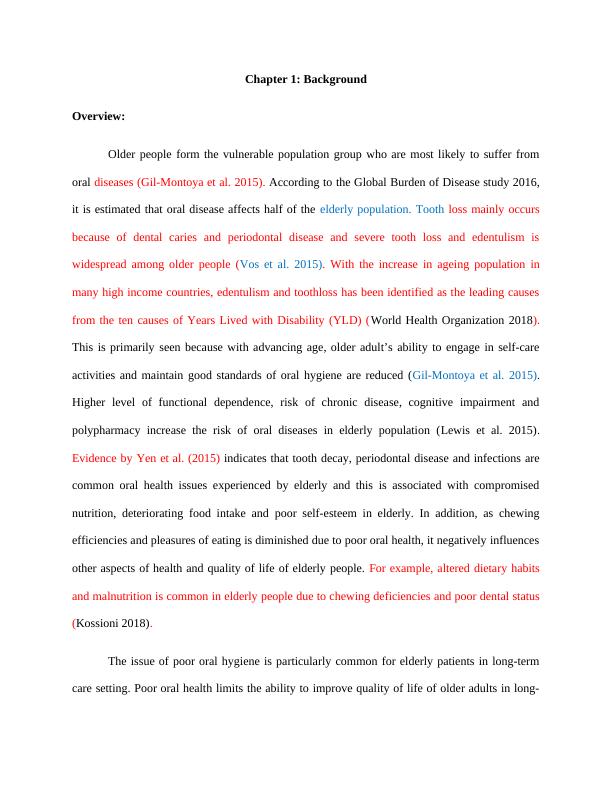
term care setting because of its direct impact on food intake. Older patients in long term care
setting have common conditions like physical frailty, polypharmacy, poor cognitive function and
chronic disease which reduce their oral self-care capabilities (Wu et al., 2017). Secondly, older
people in long-term care are dependent on their caregivers. Poor provision of oral care in long
term care facilities is multifactorial and often due to the high staff workloads, oral care is
overlooked or conducted in a routine manner (Lewis et al. 2015). Basic oral routines like
cleaning dentures can reduce risk of oral disease and aspirational pneumonia. However, elderly
patients residing in nursing homes become vulnerable to poorer oral health than other older
adults because they are dependent on their self care needs and poor oral care training and
education of healthcare assistants and nurses about basic dental care generates poorer health
outcome (Porter et al. 2015). The ultimate consequence of poor oral health is poor general health
of older adults as local periodontal infections are independent risk factors of cancer, kidney
disease and poor nutrition (Gil-Montoya et al. 2015). Hence, considering the consequences of
poor oral care on overall health of elderly patients, it is necessary to explore care professional’s
knowledge of oral dental care and identify strategies to help maintain oral health in older clients
in long term care.
Oral health and hygiene is also known to worsen for institutionalized older people with
dementia. Zenthöfer et al. (2014) reports older patients with dementia are very dependent on
healthcare assistants and nurses and invariably exhibit oral-care resistant behaviour which
contributes to the risk of poor oral health. The prospective cohort analysis concluded that in long
term care home, there is a need for permanent specially adapted intervention or protocol for
residents suffering from dementia. A literature review by Delwel et al. (2018). on oral hygiene
and oral health status of older adults with dementia revealed high scores for problems like
setting have common conditions like physical frailty, polypharmacy, poor cognitive function and
chronic disease which reduce their oral self-care capabilities (Wu et al., 2017). Secondly, older
people in long-term care are dependent on their caregivers. Poor provision of oral care in long
term care facilities is multifactorial and often due to the high staff workloads, oral care is
overlooked or conducted in a routine manner (Lewis et al. 2015). Basic oral routines like
cleaning dentures can reduce risk of oral disease and aspirational pneumonia. However, elderly
patients residing in nursing homes become vulnerable to poorer oral health than other older
adults because they are dependent on their self care needs and poor oral care training and
education of healthcare assistants and nurses about basic dental care generates poorer health
outcome (Porter et al. 2015). The ultimate consequence of poor oral health is poor general health
of older adults as local periodontal infections are independent risk factors of cancer, kidney
disease and poor nutrition (Gil-Montoya et al. 2015). Hence, considering the consequences of
poor oral care on overall health of elderly patients, it is necessary to explore care professional’s
knowledge of oral dental care and identify strategies to help maintain oral health in older clients
in long term care.
Oral health and hygiene is also known to worsen for institutionalized older people with
dementia. Zenthöfer et al. (2014) reports older patients with dementia are very dependent on
healthcare assistants and nurses and invariably exhibit oral-care resistant behaviour which
contributes to the risk of poor oral health. The prospective cohort analysis concluded that in long
term care home, there is a need for permanent specially adapted intervention or protocol for
residents suffering from dementia. A literature review by Delwel et al. (2018). on oral hygiene
and oral health status of older adults with dementia revealed high scores for problems like
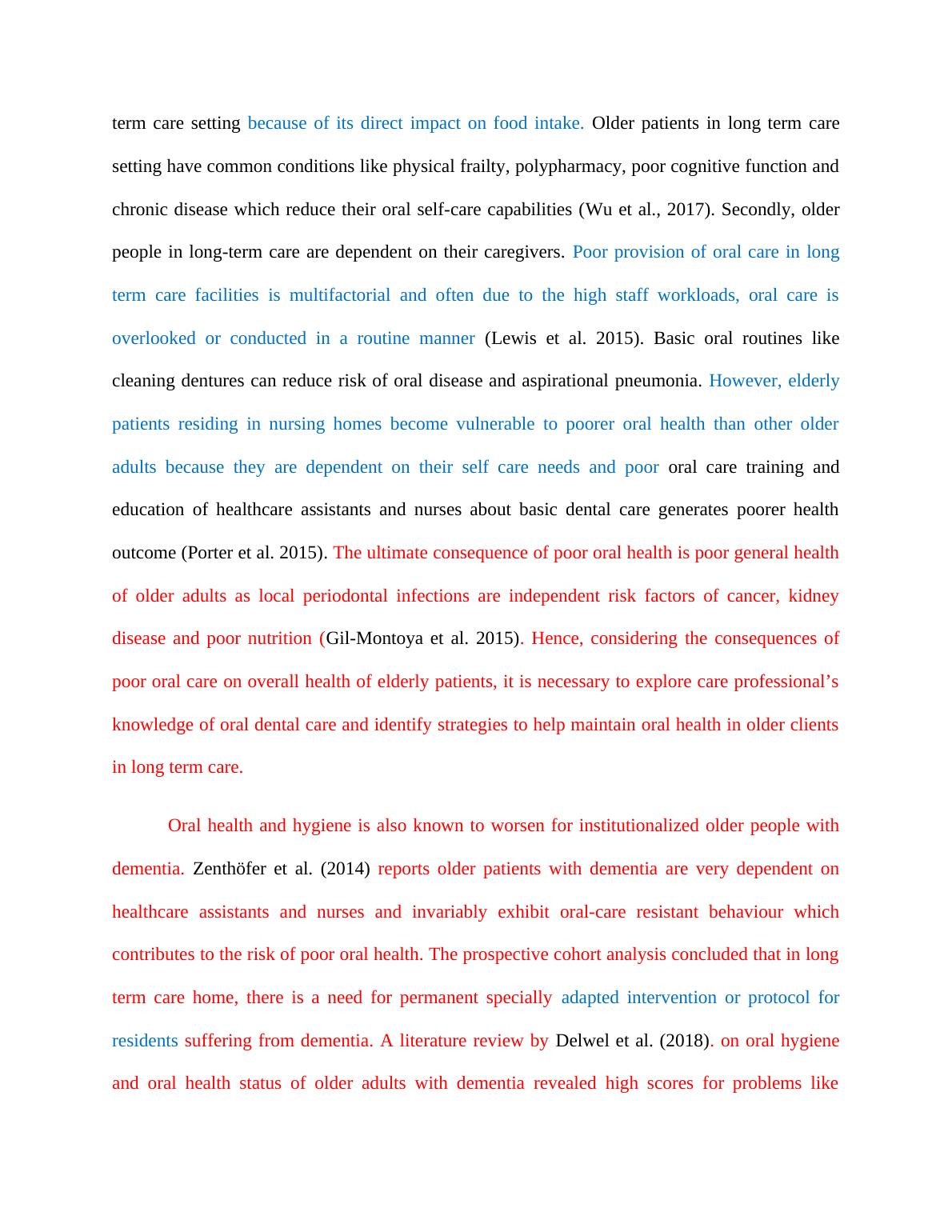
plaque, periodontitis and gingival bleeding. In addition, issues like candidiasis, stomatitis and
reduced salivary flow were more frequently present in the target population group. The analysis
of the study finding suggest that oral hygine for older people with dementia is not adequate and
there is a need to improve formal and informal oral care education for nurses and assistant carers
so that burden of oral disease in this population group is reduced (Delwel et al. 2018). Hence,
training of care professionals is critical to maintain long term oral health of this vulnerable
population group.
Several clinical guidelines and policy related to oral care justifies the significance of
increasing care porfessional’s knowledge in relation to oral hygiene. Malkin ( 2009) argues that
best care practice related to oral health includes daily assessment of oral structures, twice daily
brushing with toothbrush and fluoride toothpaste, using antiseptic mouthwashes twice daily,
considering saliva replacement for dry mouths, keeping lops supple, ensuring dental care and
documental oral care on a regular basis. However, review of research study by Willumsen et al.
(2012) reflected carers perspective on barriers to good oral health care in long term care settings.
The paper revealed that care professionals had good knowledge about oral care. However, lack
of time and patient resistance were some barriers that prevented them from providing regular oral
care to patient. The study recommended that increasing education in nursing homes and
implementing organizational strategies to give more time for oral care is necessary. Hence,
review of these barriers also suggest the importance of reviewing interventions to identify high
level evidence on effectiveness of interventions in reducing barrier to oral care for effective
health outcome of the old age adults.
Further, another research conducted by Petersen et al. (2010), suggested that the
prevalence of oral diseases varies across different nations and is high in low-income countries. In
reduced salivary flow were more frequently present in the target population group. The analysis
of the study finding suggest that oral hygine for older people with dementia is not adequate and
there is a need to improve formal and informal oral care education for nurses and assistant carers
so that burden of oral disease in this population group is reduced (Delwel et al. 2018). Hence,
training of care professionals is critical to maintain long term oral health of this vulnerable
population group.
Several clinical guidelines and policy related to oral care justifies the significance of
increasing care porfessional’s knowledge in relation to oral hygiene. Malkin ( 2009) argues that
best care practice related to oral health includes daily assessment of oral structures, twice daily
brushing with toothbrush and fluoride toothpaste, using antiseptic mouthwashes twice daily,
considering saliva replacement for dry mouths, keeping lops supple, ensuring dental care and
documental oral care on a regular basis. However, review of research study by Willumsen et al.
(2012) reflected carers perspective on barriers to good oral health care in long term care settings.
The paper revealed that care professionals had good knowledge about oral care. However, lack
of time and patient resistance were some barriers that prevented them from providing regular oral
care to patient. The study recommended that increasing education in nursing homes and
implementing organizational strategies to give more time for oral care is necessary. Hence,
review of these barriers also suggest the importance of reviewing interventions to identify high
level evidence on effectiveness of interventions in reducing barrier to oral care for effective
health outcome of the old age adults.
Further, another research conducted by Petersen et al. (2010), suggested that the
prevalence of oral diseases varies across different nations and is high in low-income countries. In
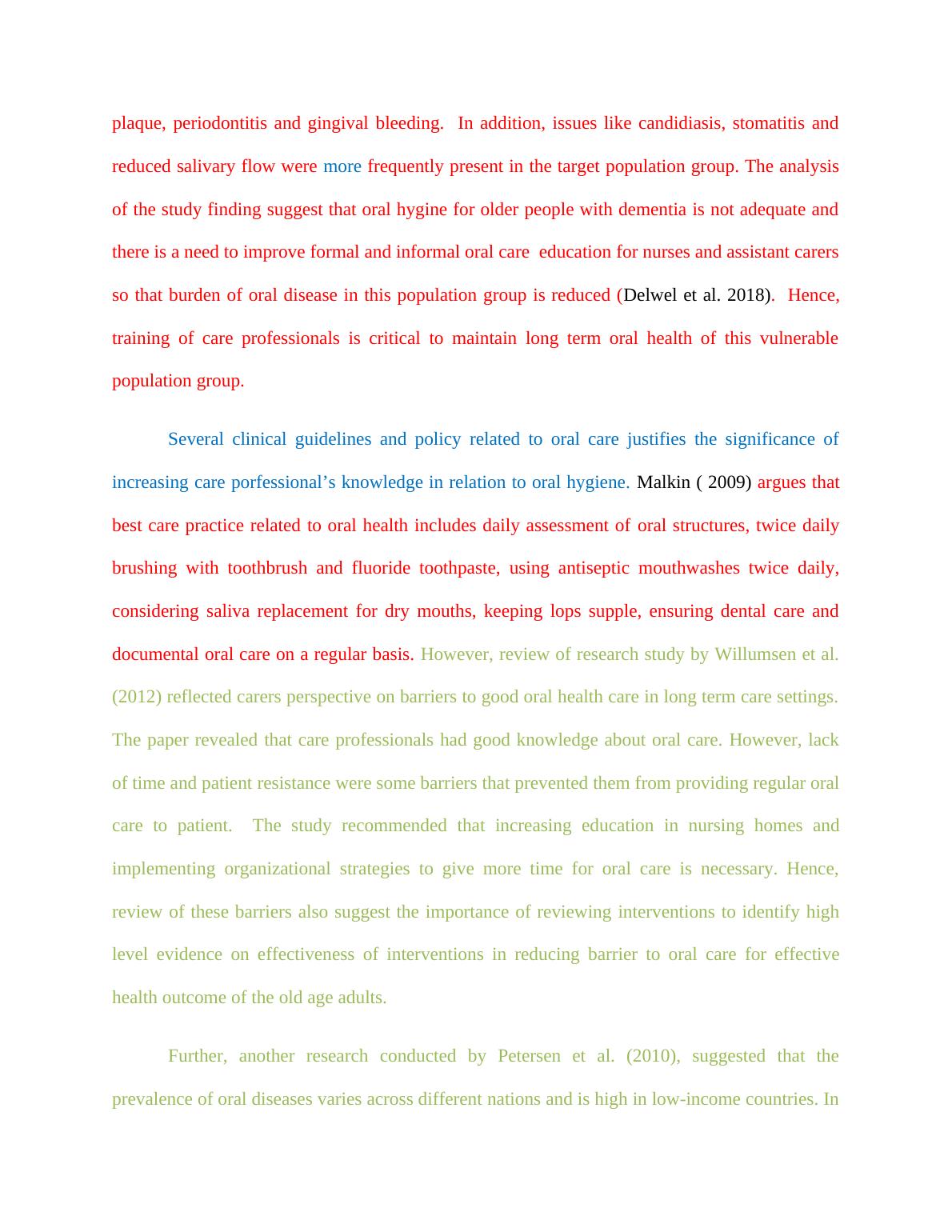
addition to this, the research also suggests lack of proper oral health guidelines in long term
healthcare settings in order to improve the overall health outcome of the old age patients and
alleviate their standard of living. Therefore, the researchers in this paper have stressed upon the
need to frame relevant oral hygiene guidelines within long term care settings so as to improve
patient outcome.
Reigle and Holm (2016) justifies that oral hygiene is necessary for older adults so as to
ensure that frail and dependent older adults receive satisfactory oral hygiene on a daily basis.
Poor oral hygiene increases risk of dental plaques and persistent dental plaques increases the risk
of gingivitis, dental caries and infection in the oral cavities. This implies that overall well-being
and general quality of life is affected for older adults because of poor oral hygiene. Hence, as
poor oral care has a negative impact on general heath of elderly, increasing healthcare
professional’s knowledge in relation to dental care is even more important to promote overall
health and well-being of the elderly patients.
This research is being done because of rising incidence of oral health issues in older
adults in long term care and its impact on risk of other disease and quality of life of older adults.
The significance of the problem is understood from the high prevalence of oral health issues in
elderly both at national and international level. The review of oral health statistics for elderly in
England, Wales and Northern Ireland revealed that 1.8 million people aged 65 years and above
are placed at a heightened risk of developing urgent dental condition like oral sepsis, dental pain
and extensive decay in teeth. It is also estimated that the number could increase to more than
50% by 2040 (Royal College of Surgeons 2017). Loss of all teeth (edentulism) and tooth loss are
significant markers of oral health and the World Health Organization report has shown that
eduntulism rates for old people between 65 to 74 years varies from 10% in low income countries
healthcare settings in order to improve the overall health outcome of the old age patients and
alleviate their standard of living. Therefore, the researchers in this paper have stressed upon the
need to frame relevant oral hygiene guidelines within long term care settings so as to improve
patient outcome.
Reigle and Holm (2016) justifies that oral hygiene is necessary for older adults so as to
ensure that frail and dependent older adults receive satisfactory oral hygiene on a daily basis.
Poor oral hygiene increases risk of dental plaques and persistent dental plaques increases the risk
of gingivitis, dental caries and infection in the oral cavities. This implies that overall well-being
and general quality of life is affected for older adults because of poor oral hygiene. Hence, as
poor oral care has a negative impact on general heath of elderly, increasing healthcare
professional’s knowledge in relation to dental care is even more important to promote overall
health and well-being of the elderly patients.
This research is being done because of rising incidence of oral health issues in older
adults in long term care and its impact on risk of other disease and quality of life of older adults.
The significance of the problem is understood from the high prevalence of oral health issues in
elderly both at national and international level. The review of oral health statistics for elderly in
England, Wales and Northern Ireland revealed that 1.8 million people aged 65 years and above
are placed at a heightened risk of developing urgent dental condition like oral sepsis, dental pain
and extensive decay in teeth. It is also estimated that the number could increase to more than
50% by 2040 (Royal College of Surgeons 2017). Loss of all teeth (edentulism) and tooth loss are
significant markers of oral health and the World Health Organization report has shown that
eduntulism rates for old people between 65 to 74 years varies from 10% in low income countries
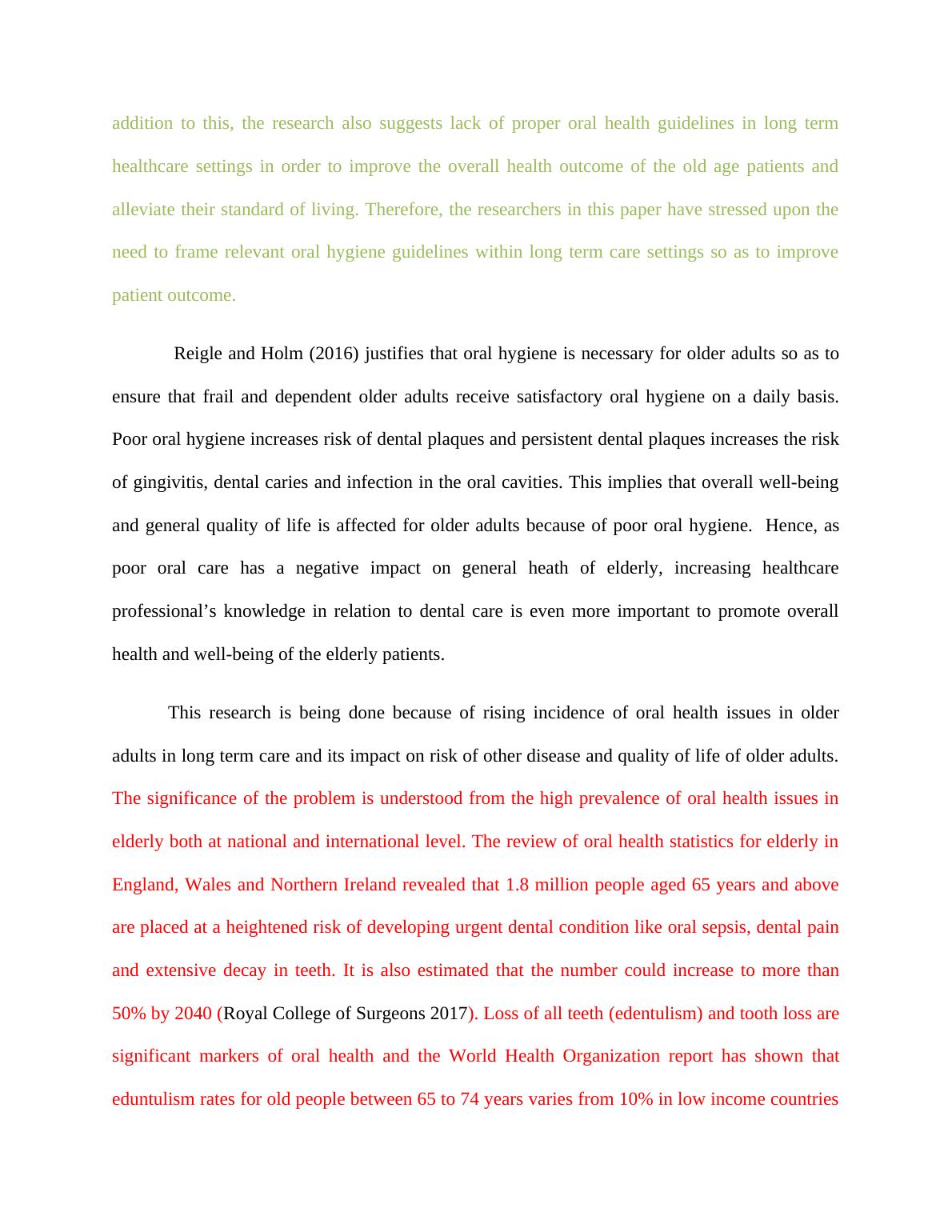
to 35% in upper middle income countries. The statistics on tooth loss rate in elderly should be
considered alarming as tooth loss in elderly occurs due to oral health issues like periodontal
disease and trauma (Sheehan, McGarrigle and O’Connell 2017). Hence, the discussion of the
above statistics gives an indication regarding urgent need to improve oral health care for older
people. This research is an effort to understand the role of care professionals such as the personal
healthcare assistants and nursing staff in improving oral health statistics for older people in
Ireland as well as in other countries.
The review of past research studies gives many evidence regarding the reason for
conducting research in the area of interventions to improve oral care for elderly in long term
care. Long term care residents are particularly vulnerable population group who are likely to
suffer from poor health status. A cross-sectional survey of oral health status of long term care
residents in Canada by Matthews et al. (2012) revealed that these residence have a high
prevalence of untreated oral disease and poor use of oral care services. The caries rate was high
for dentate and partially dentate group. In addition, the study justified that untreated oral care
needs were high for the residents because they rely on healthcare assistants who may be
overloaded with daily work and have little training in oral disease management. Other limitations
identified in LTC included lack of enforcement of oral care policies. Hence, this problem in LTC
justified the need for reviewing interventions implemented to improve oral care in the target
setting. This evidence is also consistent with the study by Wu et al. (2017) as this study indicated
that LTC has poor provision of oral care because of high staff workload, lack of funding and
insufficient time. Reigle and Holm (2016) argues that care professionals have a vital
responsibility to provide adequate dental care in long-term setting as dental professionals are
lacking in such organizations and even if they are present, they stay for a very short duration.
considered alarming as tooth loss in elderly occurs due to oral health issues like periodontal
disease and trauma (Sheehan, McGarrigle and O’Connell 2017). Hence, the discussion of the
above statistics gives an indication regarding urgent need to improve oral health care for older
people. This research is an effort to understand the role of care professionals such as the personal
healthcare assistants and nursing staff in improving oral health statistics for older people in
Ireland as well as in other countries.
The review of past research studies gives many evidence regarding the reason for
conducting research in the area of interventions to improve oral care for elderly in long term
care. Long term care residents are particularly vulnerable population group who are likely to
suffer from poor health status. A cross-sectional survey of oral health status of long term care
residents in Canada by Matthews et al. (2012) revealed that these residence have a high
prevalence of untreated oral disease and poor use of oral care services. The caries rate was high
for dentate and partially dentate group. In addition, the study justified that untreated oral care
needs were high for the residents because they rely on healthcare assistants who may be
overloaded with daily work and have little training in oral disease management. Other limitations
identified in LTC included lack of enforcement of oral care policies. Hence, this problem in LTC
justified the need for reviewing interventions implemented to improve oral care in the target
setting. This evidence is also consistent with the study by Wu et al. (2017) as this study indicated
that LTC has poor provision of oral care because of high staff workload, lack of funding and
insufficient time. Reigle and Holm (2016) argues that care professionals have a vital
responsibility to provide adequate dental care in long-term setting as dental professionals are
lacking in such organizations and even if they are present, they stay for a very short duration.
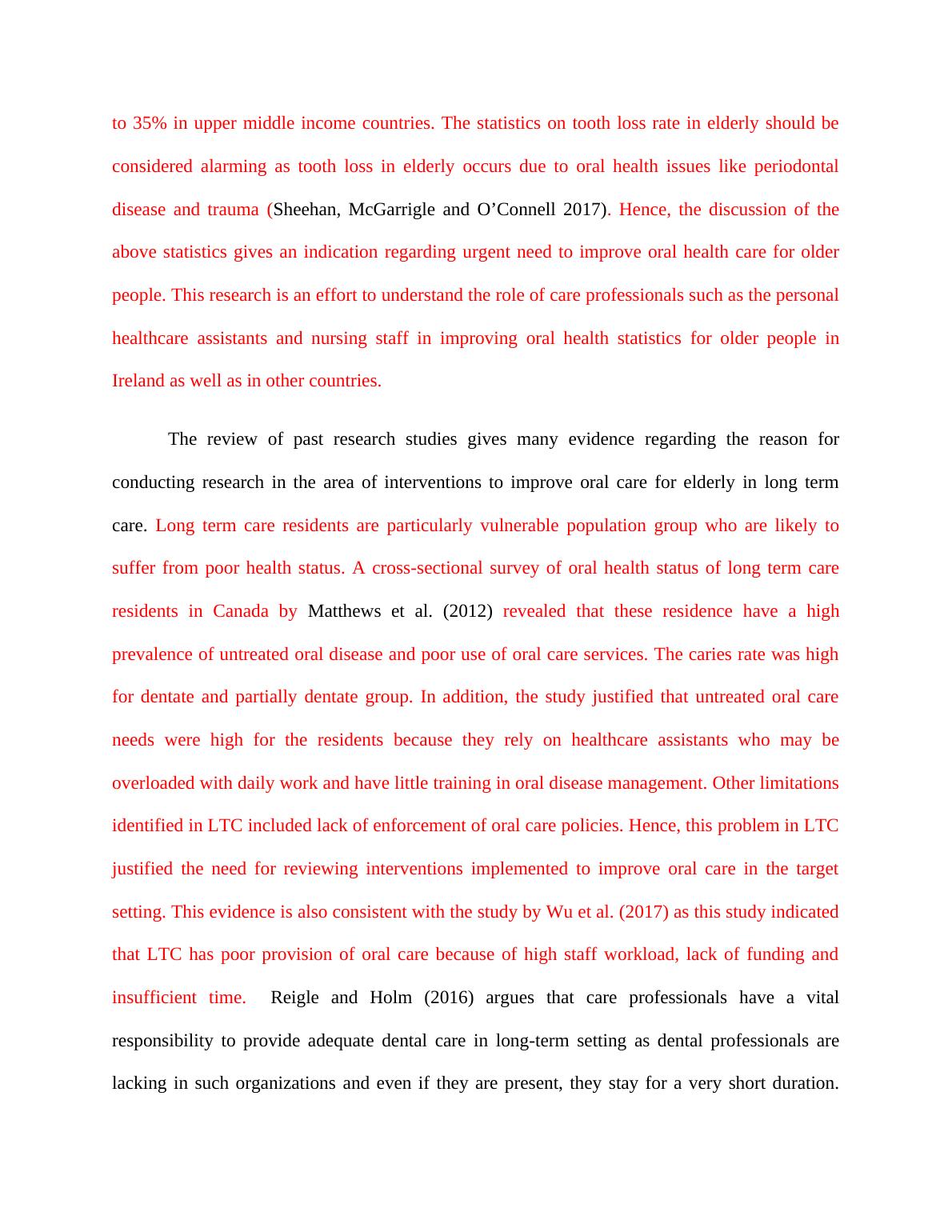
Hence, presence of dentist for a short duration cannot prevent risk of oral diseases in elderly.
Care providers are better positioned to implement appropriate dental care if they are adequately
trained by the health care organization.
Coker et al. (2017) argues that no specific guidelines or a standard exists in relation to
oral hygiene care practice for the care providers that must be followed stringently. For this
reason, Royal College of Surgeons (2017) has prioritized providing oral health training for health
professionals like junior doctors, healthcare assistants, nurse and allied health staff so that they
develop understanding regarding effective assessment of the mouth and gain knowledge
regarding the manner in which care should be provided to older people with dementia and those
who have limited capacity to give consent in relation to oral health. The public health of Ireland
has also targeted developing National Oral Health Policy to inform new services for oral health
and review current health care resources. Hence, attention to prevention of oral disease at
national level indicates the significance of addressing oral health issue in elderly (Department of
Health. 2015). Therefore, the problem gives direction for new research to find out how far long
term care has been successful in implementing appropriate interventions to improve oral care
competencies among care providers, address knowledge gap and how far these interventions
have been successful in improving oral health outcomes in the elderly population.
Rationale for research:
Oral care for dependent elder residents in LTC is a challenge that is expected to increase
with the ageing of the population. Numerous research have been done in the past decade in oral
care topics such as attitude and behaviour related to oral care, education and oral hygiene
intervention and impact of organizational influence on oral health status of residents (McNally et
Care providers are better positioned to implement appropriate dental care if they are adequately
trained by the health care organization.
Coker et al. (2017) argues that no specific guidelines or a standard exists in relation to
oral hygiene care practice for the care providers that must be followed stringently. For this
reason, Royal College of Surgeons (2017) has prioritized providing oral health training for health
professionals like junior doctors, healthcare assistants, nurse and allied health staff so that they
develop understanding regarding effective assessment of the mouth and gain knowledge
regarding the manner in which care should be provided to older people with dementia and those
who have limited capacity to give consent in relation to oral health. The public health of Ireland
has also targeted developing National Oral Health Policy to inform new services for oral health
and review current health care resources. Hence, attention to prevention of oral disease at
national level indicates the significance of addressing oral health issue in elderly (Department of
Health. 2015). Therefore, the problem gives direction for new research to find out how far long
term care has been successful in implementing appropriate interventions to improve oral care
competencies among care providers, address knowledge gap and how far these interventions
have been successful in improving oral health outcomes in the elderly population.
Rationale for research:
Oral care for dependent elder residents in LTC is a challenge that is expected to increase
with the ageing of the population. Numerous research have been done in the past decade in oral
care topics such as attitude and behaviour related to oral care, education and oral hygiene
intervention and impact of organizational influence on oral health status of residents (McNally et
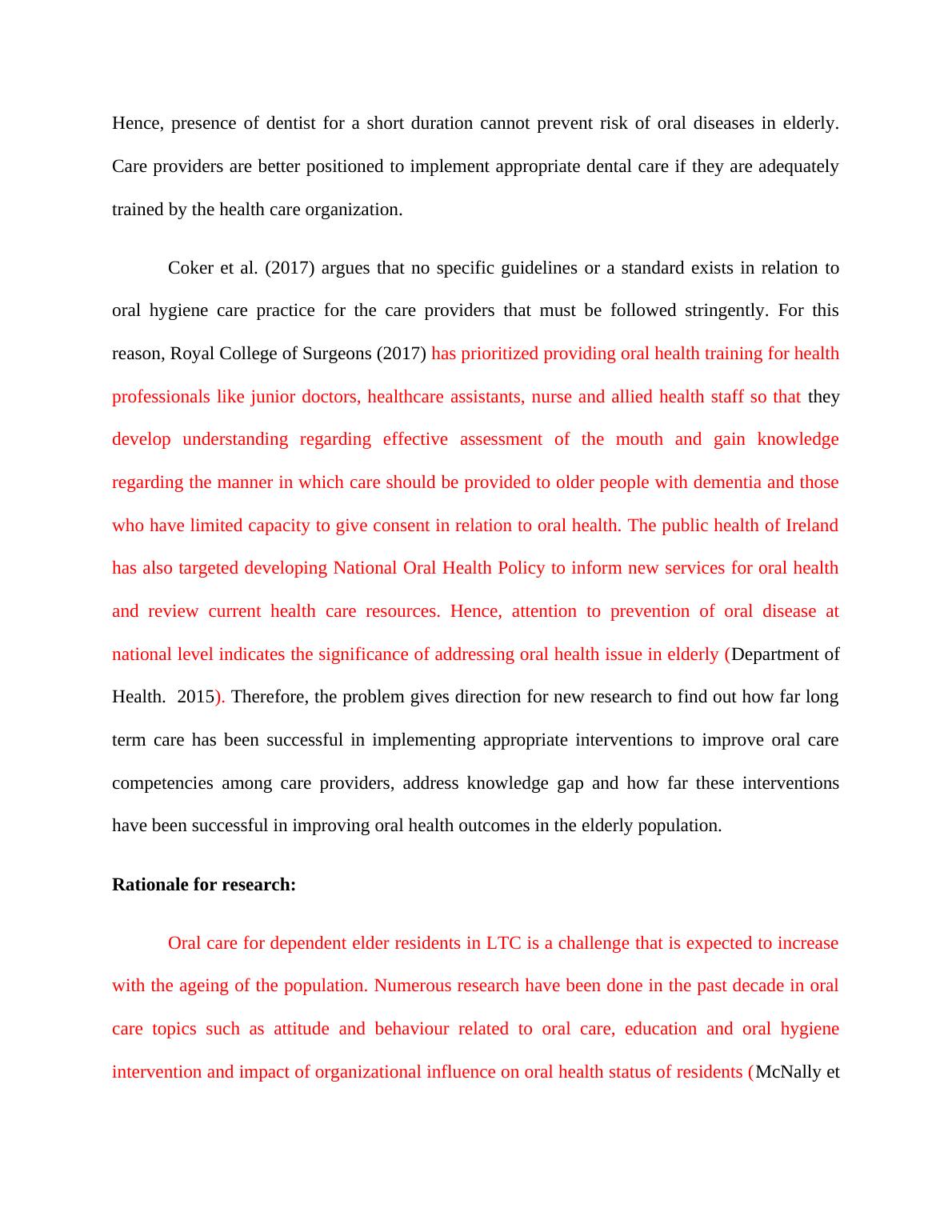
al. 2012). Therefore, by using critical thinking and effective research skills, the systematic
review of past research papers can help to fulfil the main aim and objectives of this research. The
main aim of this research is to conduct a systematic review on interventions to improve the
quality of oral care for elderly in long term care setting. The main rationale for choosing care
professionals such as health care assistant, nurses and healthcare staff as the research sample
can be explained as their direct involvement with the patients for the maintenance of oral
hygiene. It is important to note here that the care professionals are overburdened with multiple
patient care responsibilities in LTC and they have poor knowledge regarding utilization of oral
care protocol. Hence, the effect of interventions on supporting carers to improve knowledge
related to oral care can have positive implications on future service improvement in a targeted
healthcare setting. Salamone et al. (2013) justifies that carers should be aware of risk factors
related to poor oral health, effective assessment of oral health and assist patients in managing
oral hygiene. Implementation of effective interventions related to best practice in oral hygiene
can influence care professional’s capability related to oral assessment and oral hygiene and this
research aims to identify those interventions where best practice elements related to oral care has
been researched and implemented within long term care setting so as to achieve positive
outcome.
The above discussion justified the rationale for conducting research in the area. The
systematic review of relevant papers will help to make proper judgments related to validity of the
research findings and using them to develop recommendations for improving oral health care
service in Ireland and enhancing resources to meet oral health needs of elderly residents in long
term care. In addition, searching different studies on interventions that increase health care
workers knowledge of oral hygiene has been prioritized for this systematic review as it will help
review of past research papers can help to fulfil the main aim and objectives of this research. The
main aim of this research is to conduct a systematic review on interventions to improve the
quality of oral care for elderly in long term care setting. The main rationale for choosing care
professionals such as health care assistant, nurses and healthcare staff as the research sample
can be explained as their direct involvement with the patients for the maintenance of oral
hygiene. It is important to note here that the care professionals are overburdened with multiple
patient care responsibilities in LTC and they have poor knowledge regarding utilization of oral
care protocol. Hence, the effect of interventions on supporting carers to improve knowledge
related to oral care can have positive implications on future service improvement in a targeted
healthcare setting. Salamone et al. (2013) justifies that carers should be aware of risk factors
related to poor oral health, effective assessment of oral health and assist patients in managing
oral hygiene. Implementation of effective interventions related to best practice in oral hygiene
can influence care professional’s capability related to oral assessment and oral hygiene and this
research aims to identify those interventions where best practice elements related to oral care has
been researched and implemented within long term care setting so as to achieve positive
outcome.
The above discussion justified the rationale for conducting research in the area. The
systematic review of relevant papers will help to make proper judgments related to validity of the
research findings and using them to develop recommendations for improving oral health care
service in Ireland and enhancing resources to meet oral health needs of elderly residents in long
term care. In addition, searching different studies on interventions that increase health care
workers knowledge of oral hygiene has been prioritized for this systematic review as it will help
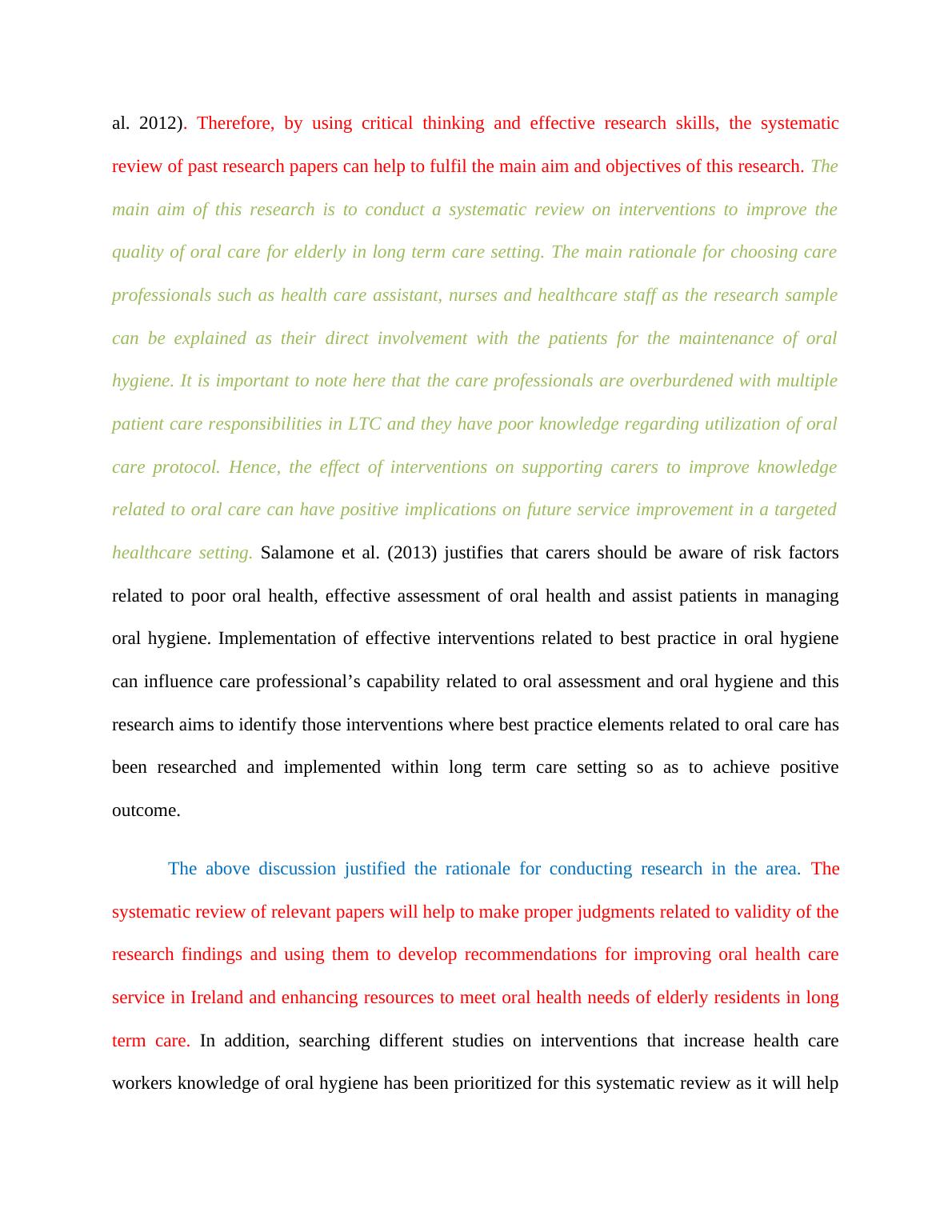
to analyse whether education and training can improve the ability of the care providers to
provide direct oral hygiene and care or not. It will also help to identify the factors that influence
oral care and evaluate interventions to develop best practices related to oral hygiene care to
improve quality of life of older adults.
provide direct oral hygiene and care or not. It will also help to identify the factors that influence
oral care and evaluate interventions to develop best practices related to oral hygiene care to
improve quality of life of older adults.
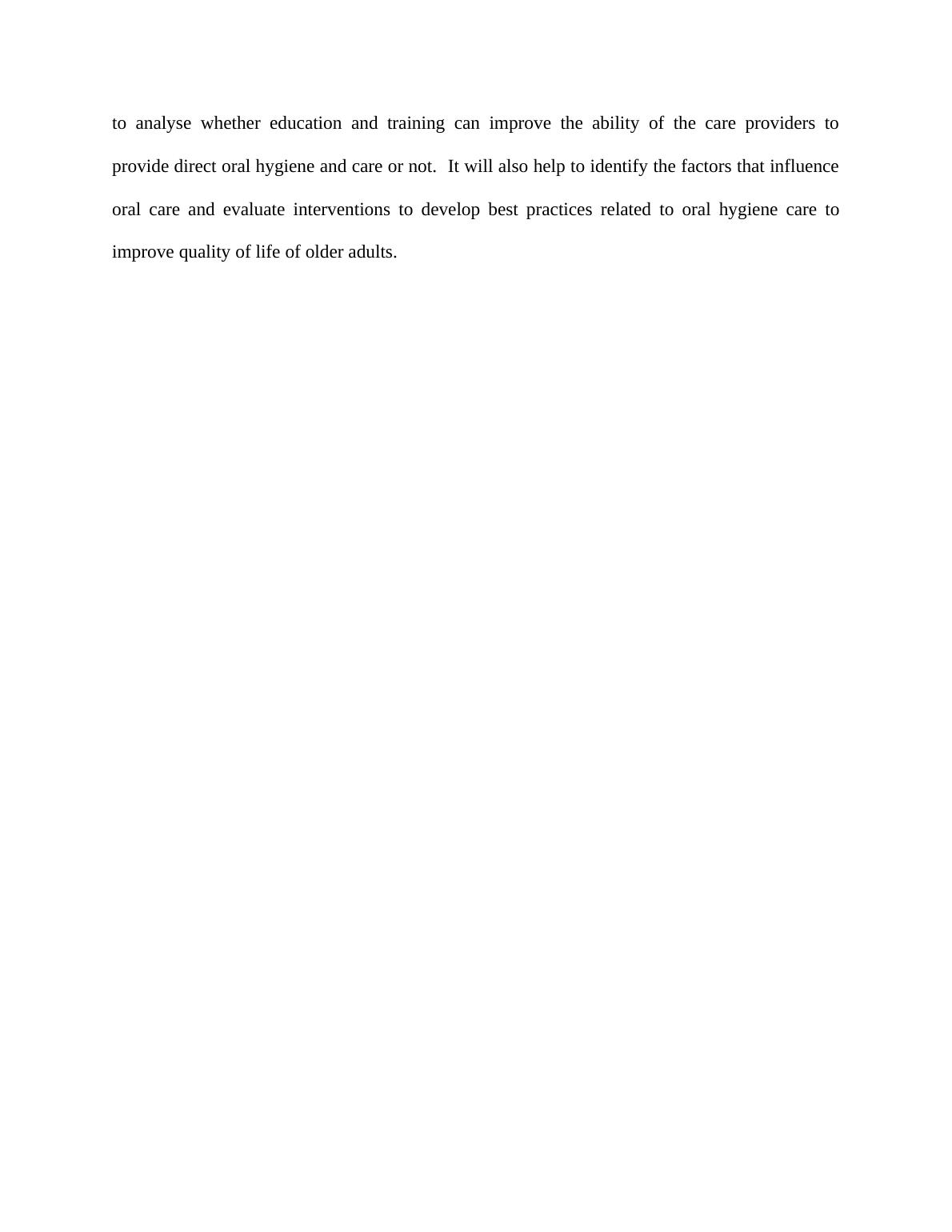
End of preview
Want to access all the pages? Upload your documents or become a member.
Related Documents
Aged care oral health in Australialg...
|14
|4370
|47
Poor Oral Health Leads to Poor General Health in Elder Patientslg...
|18
|4734
|428
Materials and Methods Case Study 2022lg...
|21
|4371
|19
Dental Implants Success and Failure | Annotated Bibliographylg...
|9
|2282
|23
HEALTHY PEOPLE 2020 IMPACT PAPERlg...
|6
|1469
|17
Impact of Poor Oral Health on Aspiration Pneumonia in Elderly Patientslg...
|8
|2006
|163
